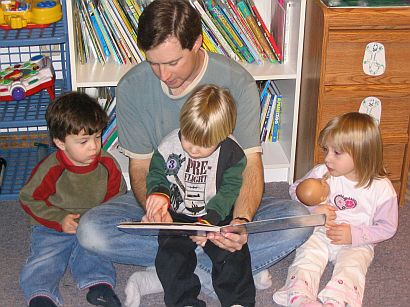Family Literacy
A-Z of Literacy (1)
Read ~ Write ~ Surf ~ Sing
Here are some tips and activities to help encourage family literacy in your home and community!!
Ask your child questions about the story you're reading to ensure comprehension.
Book family time to read with your children every day.
Create a special reading place in your home, with your child's favourite books within reach.
Donate funds to the literacy cause! For information on programs in your community, look under LEARN in the Yellow Pages.
Encourage children to read words on TV, street signs, mugs and T-shirts.
Find new stories to read with your children every week. Vary their length and subject matter.
Give your time to read aloud to a child.
Have a child read a book to you.
International Literacy Day is held on September 8 every year. Celebrate the day by picking up a book and reading to a child.
January 27 is Family Literacy Day! Visit www.fld-jaf.ca for a complete listing of Family Literacy Day events across Canada.
Keep teens reading. Give them books, newspaper articles and magazines about things that interest them - music, movies, TV and computers.
Let children count out the change when making a purchase. Reinforce the importance of math in everyday life!
Make every day a learning day. Ask your children to make a shopping list, read recipes together or help them make a calendar of their weekly activities.
Newborns benefit from reading too!
Organize a children's book club with friends in your neighbourhood.
Pick one night a week to make a regular visit to the library.
Quiet, cozy reading spaces are good places for your child to read independently.
Remember that children learn by example - if you recognize the importance of reading, your children will too!
Start early! It's never too early to read to your children.
Treat a child to a story a day.
Use reading time to create a special bond with a child.
Volunteer your time. Family literacy groups in your community could use your help with tutoring adults, reading to children and helping out with administrative tasks.
Write a letter.
X-ercise your mind! Reading ability is like a muscle, if you don't exercise it often, you will not maintain the same level of reading ability as you get older. So - "use it or lose it"!
You are the key to improving a child's reading ability by placing a high priority on reading in your home.
Zap off the TV - pick up a book instead!

A-Z of Literacy (2). There's more...
Act as a reading role model for your kids by reading in your spare time. Remember that children learn by example.
Babies benefit from listening to you read - it boosts their brain development.
Coordinate a children's book club with your neighbours.
Develop a consistent homework routine by setting up a regular study time for your children every day.
Engage in sing-along sessions with your children.
Follow a recipe with your child - it's a great way to excercise both reading and math.
Give the gift of words - make a donation to a literacy program in your community.
Have your child count out the change required to make a purchase. Reinforce the importance of math in everyday life.
Introduce a family board gami night, where children are encouraged to read instructions and keep score.
January 27th is Family Literacy Day! Visit www.fld-jaf.ca for a complete listing of Family Literacy Day events across Canada.
Keep books, magazines and other reading material on-hand for long trips in the car, train, subway etc.
Look up the meaning of funny words, like 'onomatopoeia' and 'Chinook', to test your family's word power.
Make everyday tasks learning experiences. Ask your children to write out your shoping list, address an envelope, or help them make a calendar of their weekly activities.
Navagate the Internet with your child to find fun and educational Web Sites.
Offer your time. Family literacy groups in your community could use your help with tutoring adults, reading to children and administrative tasks.
Purchase gently used children's books at garage sales. This is a cost-effective wayof adding to your child's book collection.
Question your children about the story you are reading with them, to ensure comprehension.
Read stories out loud together. This will help develop your child's oral communication skills.
Set up a quiet and cozy reading corner in your home, with your child's favorite book within easy reach.
Turn off the television and put away the video games- pick up a book instead.
Use it or lose it! Reading is like a muscle, if you don't excercise it often you will not maintain the same level of reading ability as you get older.
Visit your public library every week.
While travelling, read billboards, street signs or license plates together, and show your children the proper way to read a map.
X-ercise your mind by doing crossword puzzles, word jumbles and word searches.
You can encourage your teens to keep reading by providing them with books, newspaper articles and magazines about the things that interest them- such as music, movies , TV and computers.
Zoo outings and visits to the local museum can be fun and educational too! Read books on animals or artifacts with your children before or after your outing.
For more family literacy tips, activities and event information please visit